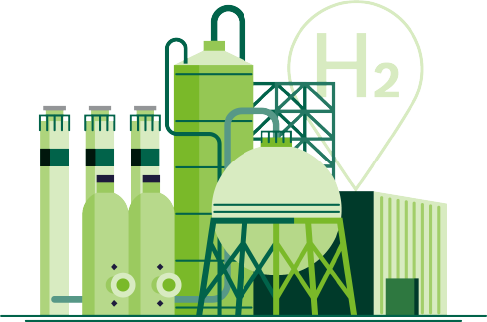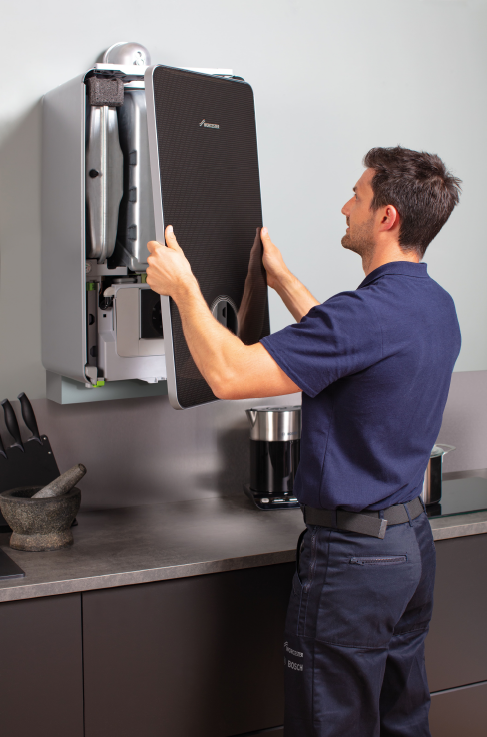Call us today 0800 999 2240
Hydrogen Boilers
Hydrogen Boilers:
An
Alternative to Gas Central
Heating?
Heating our homes with natural gas can’t go on if we’re
to lower carbon emissions from home heating. And that’s
where the hydrogen boiler comes in. Hydrogen is a lowcarbon
alternative to natural gas that could be delivered to
properties through the existing gas network.
IMPORTANT: It is not yet possible to buy or install a
hydrogen-ready boiler. However, manufacturers such as Baxi
and Worcester Bosch have developed working prototypes.

Why do we need an alternative to gas central heating?
Not only are fossil fuels running out, but the continued use
of them is emitting greenhouse gases such as carbon into
the atmosphere. These gases cannot escape our atmosphere,
causing temperatures across the globe to rise which is
changing our climate.
As part of the worldwide climate emergency, the UK
government is working towards reducing the country’s
carbon emissions. Specifically, the UK government has
passed into law that, as a nation, our carbon emissions will
be at net-zero by 2050.
Heating contributes around a third of the UK’s total carbon
emissions. So, finding an alternative fuel and technology
would reduce our carbon footprint significantly.
However, currently, 8/10 homes in the UK use gas boilers
to fuel their central heating. And while renewable heating
systems such as heat pumps and solar thermal don’t emit
carbon into the atmosphere, replacing all gas boilers with
renewables would be costly and impractical.
So, rather than replacing the heating systems, a better
solution would be to make the fuel low-carbon. Hydrogen
is a low-carbon alternative to natural gas that can provide
heating and hot water to homes via the familiarity of a boiler.


Why hydrogen boilers?
For the heating and hot water industry, removing carbon
is much more difficult, largely because of the existing
infrastructure, where the majority of UK homes use natural
gas for heating.
Yet, with a third of UK greenhouse gases coming from
our homes, it is quite clear that the UK will not meet its
climate change targets without a change in home heating
technology and fuel.
Replacing natural gas boilers with hydrogen gas may be the
simplest solution to the nation’s heating problems. The only
by-product of burning hydrogen gas is water, meaning that
it is a carbon free fuel source and could be a key method to
help decarbonise heating and hot water in UK homes.
How do hydrogen boilers work?
A hydrogen boiler, in theory, can fit into a current boiler’s physical space in the home without much disruption to the homeowner. With a similar build to existing boilers, installers will already have most skills necessary to fit these products too.
Over the last few years, leading boiler manufacturer Worcester Bosch have not only been advocating for hydrogen, but they have also developed a prototype boiler that can run on 100% hydrogen gas.
The prototype has been designed to also run effectively on natural gas. This means that in the future if hydrogen gas becomes reality, those who have a ‘hydrogen-ready’ boiler can simply convert to hydrogen without the need for an entirely new heating system.


The experts view
“The development of hydrogen-fired boilers will mean millions of existing heating systems in our homes can be saved, rather than the entire system needing to be replaced.
“The beauty of hydrogen as an alternative to natural gas is that as well as water as a by-product, we have already solved issues such as visible flame burn using a UV cell. The gas network is also in place, so homeowners won’t experience any major infrastructure disruption.”
“With fully developed prototypes, various trials planned and many heating engineers and manufacturers in agreement that this could be a viable solution to decarbonise heating and hot water, we are hopeful that the future will be hydrogen.”
Martyn Bridges – Director of Technical Communication and Product Management
What are the advantages and disadvantages of a hydrogen ready boiler?
Many existing homes, despite energy efficiency improvements, still have relatively poor insulation and high rates of air exchange with the outdoors.
A hydrogen-ready boiler is capable of accommodating an existing high temperature heating system in a hard-to-heat building. Where costs are highly constrained, the boiler (and conversion of the local gas network) provides an accessible way to deeply decarbonise heat.
Heat users have high expectations of system control; to respond quickly to heat demands providing rapid warm-up of the building, or to deliver heat reliably in extreme weather events or times of unexpected building occupancy. Compared to other technologies, boilers offer very resilient and flexible heat delivery, and provide consistent performance in a wide range of operating conditions. From an end-user point of view, a hydrogen-ready boiler does not require any behaviour change and will provide the same delivery of comfort as an existing appliance.
Hydrogen also offers benefits for the energy system as a whole. In order to use a high proportion of renewable energy generation, electricity systems need large quantities of flexible energy storage. Hydrogen offers one of the most attractive means of providing large-scale energy storage. Heat is a very large energy demand which varies rapidly at key points in the day. Currently this demand is satisfied by the distributed energy storage intrinsic to the gas networks; the continual use of a form of gas for heating will relieve stress on future electricity systems, as well as offering overall energy flexibility and resilience. Creating a national hydrogen infrastructure will also open the door to wide-scale use of hydrogen for transport. Hydrogen fuel cells are seen as an attractive technology for commercial and heavy transport applications.
How does a hydrogen-ready boiler work?
The boiler is very similar to its natural gas predecessors; it is constructed and functions in much the same way as an existing condensing boiler. While some components are distinct, such as the flame detector, most are identical to those used in natural gas boilers today.
Converting a hydrogen-ready boiler from natural gas to hydrogen will take around an hour and involve changing a couple of components such as the burner. It is envisaged that Gas-Safe engineers will be trained to work with hydrogen by a qualification scheme similar to that available today for LPG.
How much does it cost to install a hydrogen ready boiler?
There is no reason why, at similar scale, hydrogen-ready boilers should not reach a similar cost to natural gas boilers today. The ancillary components, accessories and controls will be identical to those for natural gas boilers. The property will at some stage require a hydrogen-ready gas meter to be fitted ready for network conversion, however this could be installed on a later date than the boiler. Initially, hydrogen-ready boilers might form a niche market, but a regulatory change mandating their installation would make them a high-volume technology, just as natural gas boilers are today.
Interested in hydrogen? Give our friendly team a call today.
Only use a GAS SAFE REGISTERED ENGINEER to FIT, FIX and SERVICE your gas appliances. Click here for more info.


